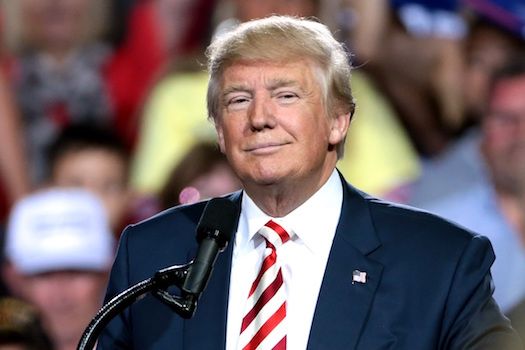Trump Calls for Capital Punishment for Convicted Opioid Traffickers
The president's remarks in New Hampshire Monday called for judicial action and a law enforcement-centric approach to the opioid epidemic.

President Donald Trump called for the implementation of the death penalty for drug traffickers convicted of selling and distributing opioids and similar substances, in remarks given on the opioid epidemic Monday afternoon.
In a televised press conference from New Hampshire, Trump expanded on his administration’s plans to combat the epidemic with what he called “brains, resolve, and toughness,” emphasizing the latter trait with expressed resolve to consider the death penalty for incriminated opioid traffickers.
“We have to get tough on those people, because we can have all the blue ribbon committees we want, but if we don’t get tough on the drug dealers, we’re wasting our time,” Trump said. “And that toughness includes the death penalty.”
Trump drew similarities between traffickers and convicted murderers, noting traffickers commonly receive get a monetary fine and/or a brief prison sentence for actions that “kill thousands of people in their lifetime and destroy many more lives than that.”
The setting of Trump’s remarks amplified their meaning — New Hampshire has been one of the most inflicted states, per resident, in the opioid epidemic. In 2016, the state’s age-adjusted rate of overdose deaths was 39 per 100,000 residents — the third highest rate in the nation, according the Center for Disease Control and Prevention (CDC).
Trump made headlines last August for describing New Hampshire as a “drug-infested den” in a phone call discussing drug trade and related crimes with Mexico president Enrique Peña Nieto. On Monday, he noted that approximately 116 people in the US die from opioid-related addiction daily, and New Hampshire’s per-population averages are nearly twice that of the national average.
He expressed gratitude for the agencies engaged in combating drug trafficking in New Hampshire, and called on local, state, and federal cooperation moving forward. For his and his administration’s own efforts, Trump cited the National Prescription Drug Take Back Day of 2017, which he said resulted in the seizure of more than 900,000 lb of unused or prescription drugs.
Trump also said customs and border protection agencies seized nearly 1,500 lb of fentanyl last year — a total nearly 3 times greater than the amount seized in 2016. He alluded the attempts to illegally move drugs across US borders came from traffickers in Mexico and China, noting that he told those countries, “Don’t send it.”
Looking forward, Trump said a planned $6 billion in funding designated by Congress for 2018-19 will go towards fighting the opioid epidemic, which will result in programs designed to progress the development of non-addictive painkiller therapy, among other efforts.
He also expressed hope the US Department of Justice will soon bring “major litigation” to pharmaceutical companies involved in opioid development and distribution — a process he credited various state attorney generals for initiating.
Speaking further on preventive measures, the Trump administration intends to cut nationwide opioid prescriptions by one-third over the next 3 years. Alex Azar, Secretary of Health and Human Services and former Eli Lilly president, emphasized this goal in his own remarks given at Trump’s press conference.
Azar called for “evidence-based, science-based, compassionate treatment” for the patients of opioid addiction, and echoed Trump’s goals for addiction and trafficking prevention.
Another major element of Trump’s preventive measures is a planned anti-opioid use advertisement campaign, in the vein of anti-tobacco campaigns.
“That’s the least expensive thing we can do, where you scare them from being like the people in the commercials,” Trump said. “And we’ll make them very, very bad commercials.”
Among all his colorful statements on the epidemic that in just 15 years nearly quadrupled the domestic drug overdose death rate per 100,000 people, Trump’s promise of a drug-free culture for the next generation may have been his strongest.
“This scourge of drug addiction in America will stop,” Trump said. “It will stop.”